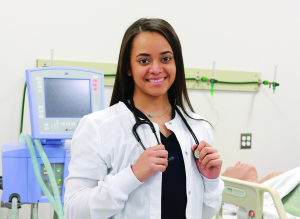Becoming Health Care Heroes
 Health science students enter field despite pandemic
Health science students enter field despite pandemic
Not just anyone can be a health care provider.
Much like the firefighter who runs toward danger when most others are running away, those called to the health science careers offered at Weatherford College haven’t let COVID-19 keep them from their destiny.
Briana Beamer is currently studying in WC’s Respiratory Care program and supports herself working as a cardiac monitor in a Metroplex hospital. When asked whether the virus gave her second thoughts about entering her chosen field, she answered emphatically.
“No, COVID actually propelled me to finish my degree as a respiratory therapist,” she said. “I saw the pandemic unfold and remember the first positive case that came to our hospital. I saw all of the frontline medical workers band together to provide the best care and solutions for each patient. It made me want to become a part of that team even more.”
The Weatherford native is in her second semester. She is scheduled to complete her degree in May of 2022, and she says she can’t wait to get started as a respiratory therapist.
“My favorite thing about this field is the ability to breathe life into people,” Beamer said. “The primary thing we accomplish with each patient is managing their ability to breathe and to breathe better. I am so honored to be on a career path to help people.”
Obviously, the last 12 months have not been easy for Beamer or any WC student entering the health care field. Hands-on training sessions in area hospitals/clinics, known as “clinicals,” are required by the state and are critical in preparing these future professionals. When all classes nationwide went virtual in the spring of 2020, many of these students had to adjust to virtual lecture sections overnight and also cope with the reality of working on the front lines amongst COVID-positive patients.
Emily Boetz is a registered nurse at Palo Pinto General Hospital in Mineral Wells and a recent WC nursing graduate.
“If I am being honest, the thought of joining the nursing profession during a pandemic scared me,” she said. “But I never second-guessed my choice because I knew in my heart I couldn’t imagine doing anything else.”
COVID hit during Boetz’s third semester of nursing school, throwing her face-to-face classes immediately online and interrupting some of her clinicals at John Peter Smith Hospital in Fort Worth. She said she had some anxiety about the altered schedule and her preparation for her licensure exam, but she and her instructors put in the extra work to make sure she was ready.
“My instructors went above and beyond in filling the gap,” Boetz said. “COVID-19 made nursing school so much harder but it also made me become much more versatile as a person and a nurse.
“Whether it’s celebrating with someone who just came off the ventilator or being at someone’s bedside at the end of their life, I have the opportunity to make a positive impact on someone’s life,” she said. “This I consider a privilege and a joy.”
David Coone is a 2017 WC graduate, now working as a nurse at St. David’s Georgetown Hospital. He said an instructor’s words have rung eerily true.
“We had a class that talked about pandemics and the impact they could have,” Coone said. “The professor told us that our nursing class would most likely see a pandemic in our career. I didn’t think it would actually happen, especially only a few months after becoming a nurse.
“The virus is a real thing; unlike any other virus we have seen. I’ve seen first-hand what it can do and the impact it has had on the hospital’s staff, patients and their families.”
But he remains optimistic in the battle against COVID-19.
“I think we are making great progress against the virus and soon we will be able to manage it better.”
The pandemic has impacted all aspects of higher education, but none more pervasively than in the health sciences. WC’s nursing, respiratory care, sonography, radiological technology, phlebotomy, occupational therapy assistant, physical therapy assistant and health-related workforce programs have all pivoted to provide safe training while sending graduates into fields that have changed in a few short months.
Boetz continues her work on the front lines, serving in the Intensive Care Unit at PPGH. Although the end of her RN education and the beginning of her career have been a challenge because of the virus, she says she wouldn’t change a thing about her path.
“I chose Weatherford College because all of the best nurses I know went to Weatherford College for nursing,” she said. “It is so rewarding to make a difference in the lives of others.”